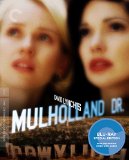| Reviews & Columns |
|
Reviews DVD TV on DVD Blu-ray 4K UHD International DVDs In Theaters Reviews by Studio Video Games Features Collector Series DVDs Easter Egg Database Interviews DVD Talk Radio Feature Articles Columns Anime Talk DVD Savant Horror DVDs The M.O.D. Squad Art House HD Talk Silent DVD
|
DVD Talk Forum |
|
|
| Resources |
|
DVD Price Search Customer Service #'s RCE Info Links |
|
Columns
|
|
|
Mulholland Dr. - The Criterion Collection
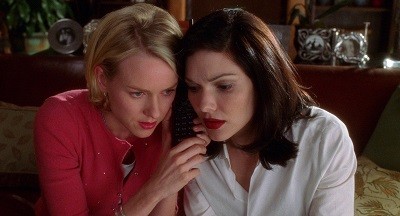 My love of film has transformed over time, and there are "landmark" pieces of filmmaking marking my transition from casual movie lover to (semi-)knowledgeable cinephile. Mulholland Dr. was the first film I saw by director David Lynch, and one of the first pieces of "abstract" filmmaking that I found intriguing rather than frustrating. The desire to "figure out" a movie like Mulholland Dr. is probably common, especially for Lynch newcomers, an approach seemingly encouraged by the DVD's "10 Clues" provided by Lynch for unlocking the secrets of the movie, but Lynch's films are interpreted emotional experiences that are then interpreted again for the audience's benefit. Although there is a truth to the movie, there isn't a "solution"; to focus on how the pieces fit together rather than the mood the film creates is to miss the point.
My love of film has transformed over time, and there are "landmark" pieces of filmmaking marking my transition from casual movie lover to (semi-)knowledgeable cinephile. Mulholland Dr. was the first film I saw by director David Lynch, and one of the first pieces of "abstract" filmmaking that I found intriguing rather than frustrating. The desire to "figure out" a movie like Mulholland Dr. is probably common, especially for Lynch newcomers, an approach seemingly encouraged by the DVD's "10 Clues" provided by Lynch for unlocking the secrets of the movie, but Lynch's films are interpreted emotional experiences that are then interpreted again for the audience's benefit. Although there is a truth to the movie, there isn't a "solution"; to focus on how the pieces fit together rather than the mood the film creates is to miss the point.
The bulk of the story focuses on Betty (Naomi Watts), a young aspiring actress who has temporary access to stay at her aunt's place in Los Angeles. When she arrives, she finds another woman already in the apartment, a woman who later introduces herself as Rita (Laura Elena Harring). Betty assumes that Rita is a friend or employee of her aunt's, but Rita is actually hiding in the apartment, having walked away from a severe car accident on Mulholland Dr. with little physical damage but no memory of who she is. After Rita confesses this to Betty, the pair begin investigating her identity. At the same time, Betty begins to go on auditions looking for her big break, and a hot young director named Adam Kesher (Justin Theroux) attempts to resist pressure from mob-affiliated financiers to cast a specific actress in his new movie.
Mulholland Dr. was shot as a pilot for ABC. When the network passed on the show, negotiations to reshape it into a feature film began and stretched out over a whole year. Although there are a number of inconsequential roles cast with familiar faces, including Robert Forster as a police officer investigating the accident, there's little evidence that the story was changed from open-ended to conclusive after the fact, tracking a consistent contrast of moods throughout the film. Lynch paints a black-and-white picture of Hollywood, with Betty's wide-eyed innocence on one side, and Adam's struggle to retain creative control over his film (as well as other revelations later in the film) on the other. When Betty serves as the movie's focal point, her smiling face is lit up by bright California sunlight, while Rita's fateful car accident and stumbling journey toward the apartment complex where she meets Betty takes place in the middle of the night. When the characters work together, both the light and the dark tend to comingle: the women crouching inside a taxicab in the middle of the afternoon, discovering something sinister in an bright open-air apartment complex, and in the muted brown tones of Betty's temporary residence. Even the color of their hair reinforces the yin-yang combination.
Lynch is often cited as using dream logic in his films, and there's even a terrifying, unforgettable scene in the film involving a character recounting a nightmare about a person behind a diner. While the film's narrative is frequently interpreted through this lens, the true dreaminess of Lynch's work is less in the structure than it is in the atmosphere he creates. Betty isn't just a Hollywood hopeful, but her ambition practically transforms Hollywood itself.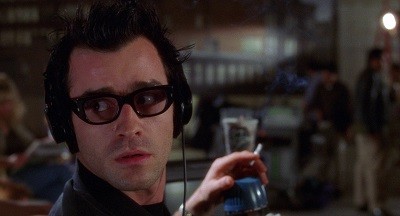 Through her eyes, the chintzy airport banner welcoming her to Los Angeles might as well be the gates of heaven opening up to her. Later, as the film slips into darkness, Lynch demonstrates a deft handle on how to summon up the anxiety of a nightmare, or the feeling of deja vu. Something as subtle as a moment in a limousine echoing another is instantly gripping, and the sight of something theoretically benign emerging from a crumpled paper bag is deeply terrifying. His skill lies in knowing how to balance the surreal with the familiar, giving the viewer just enough of a grip on cheap diner coffee cups and the loneliness of an empty kitchen to connect emotionally to the world and to the characters, before shocking them with something other-worldly.
Through her eyes, the chintzy airport banner welcoming her to Los Angeles might as well be the gates of heaven opening up to her. Later, as the film slips into darkness, Lynch demonstrates a deft handle on how to summon up the anxiety of a nightmare, or the feeling of deja vu. Something as subtle as a moment in a limousine echoing another is instantly gripping, and the sight of something theoretically benign emerging from a crumpled paper bag is deeply terrifying. His skill lies in knowing how to balance the surreal with the familiar, giving the viewer just enough of a grip on cheap diner coffee cups and the loneliness of an empty kitchen to connect emotionally to the world and to the characters, before shocking them with something other-worldly.
Mulholland Dr. is filled with good performances (even the aforementioned Forster makes an impression), but the movie really rests on Naomi Watts' shoulders. Not only does she invest Betty's impossible naivete with real sincerity, but she also gets the opportunity to play a scene in which Betty herself plays a scene in a casting director's office and blows her audience away. Both she and Harring play startlingly innocent characters in Lynch's heightened version of reality, and it's through them that their eventual love scene neither clashes against the quaint polish of the world around them (something carefully tempered by Adam's story), nor comes off as a salacious or exploitative detour. Watts' performance further develops in the latter half of the movie, which recontextualizes Betty's behavior in an entirely different light. While the first half of the movie presents the challenge of turning a caricature into a character, the latter half requires Watts to help illustrate both the way her character views herself and the way other characters view her, an impressive juggling act that she lands, with Lynch's help. It's this emotional rollercoaster -- a portrait of idealism corrupted by cynicism (possibly Lynch's abstract comment on what happened to Mulholland Dr. as a pilot) -- that makes up the core of the film. How and why that journey makes sense to the viewer is secondary.
The Blu-ray
Although the conclusion of Criterion's "dual format" experiment has generally meant a return to their plastic Scanavo cases, Mulholland Dr. is an exception, arriving as a thin digipak with a sleeve surrounding it. The new art, approved by Lynch, is a softened version of one of the film's more prominent publicity photos, of Watts and Harring staring off into the distance together, combined with the Los Angeles skyline as seen from above the Hollywood sign. The title has been given a signpost-style treatment with "David Lynch's" above it as if on the cross-street sign. Inside, the gatefold piece has an image of the blue house key on the backside and The Cowboy on the inside, and further inside, images from Club Silencio surround the actual disc tray. When folded up, the piece leaves room for the thick booklet, which features a lengthy excerpt from Chris Rodley's book Lynch on Lynch.
The Video and Audio
For this long-rumored Criterion edition of Mulholland Dr., Criterion had a new 4K master created using the original camera negative, which was then approved by both David Lynch and director of photography Peter Deming. The results themselves are excellent -- but their presentation on this disc are just short of perfect. The underlying qualities of the fresh scan itself are evident: compared to previous Blu-ray releases (all foreign), colors appear more vivid, depth is increased, and detail improves slightly, even through the luminescent haze of Los Angeles sunlight. However, examining any individual frame of the transfer (whether by pausing the disc or looking at the screencaps included in this review), there's no denying that some minor compression artifacts are visible, especially in darker scenes (check out the full-size Club Silencio screencap embedded within this paragraph). 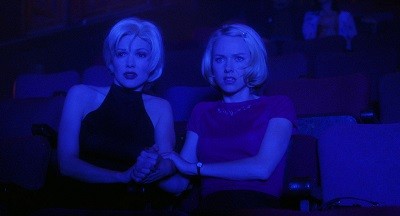 When the disc is in motion, these imperfections get mostly lost inside the light layer of film grain visible throughout the film, but it is possible to pick them out if one is looking for them, especially during the movie's many nighttime sequences. Thankfully, no other issues mar the presentation.
When the disc is in motion, these imperfections get mostly lost inside the light layer of film grain visible throughout the film, but it is possible to pick them out if one is looking for them, especially during the movie's many nighttime sequences. Thankfully, no other issues mar the presentation.
Click here to see seven additional screencaps.
Sound is a DTS-HD Master Audio 5.1 soundtrack, which, unlike the picture, is essentially flawless. There are quite a few eccentric music cues throughout the picture, starting with the jitterbug dance sequence that opens the film and continuing through right up to the nightmarish ending, and this track captures each one with authenticity, jumping from the optimism of a bright '50s pop song to the haunting electricity of Rebekah Del Rio's performance at Silencio. Dialogue sounds great, and Badalamenti's score is haunting. English captions for the deaf and hard of hearing are also included.
The Extras
Most of the foreign releases by Studio Canal feature common supplements among one another. Those extras are exclusive to Studio Canal itself, and as such, Criterion has created almost entirely new extras for their release, in the form of lengthy interviews with cast and crew. Completists will need to own one of the non-US editions (the UK edition seems to be the best bet), but the material exclusive to Criterion is excellent all by itself.
First up, David Lynch and Naomi Watts (26:44) chat about Los Angeles, the casting process, working together, and their impressions of one another. Watts is particularly grateful to Lynch, and seems charmingly nervous about talking so effusively about someone who is in the room with her. Lynch also comments on the long wait as the pilot was reborn as a movie, and the importance of sound in movies and television, and Watts talks about the awkwardness of shooting a sexual scene near the end of the movie. This is followed by another cast-focused piece in which Laura Harring, Johanna Ray, Justin Theroux, and Naomi Watts (35:38) talk more specifically about the casting and what it was like working with Lynch. All of them reference his unique style of direction, which involves more metaphor than detail, the wild experience of seeing the film for the first time, and then during its premiere at Cannes, and other anecdotes from the set (specifically about the scene between Theroux and Monty Montgomery). Johanna Ray also talks about her impressions of each actor as they first entered the picture, and her working relationship with Lynch.
Another two new interview pieces fill out the production from behind the camera (well, mostly). 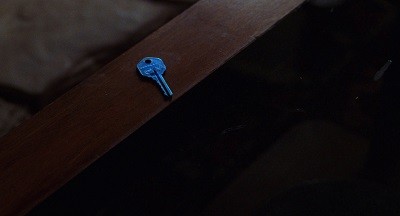 Angelo Badalamenti (19:29) reflects fondly on his journey to becoming a musician, and how he was first introduced to Lynch, as well as recounting the way he ended up with a smal part in the film as one of the Castigliane brothers. This is interspersed with some footage of him playing the Mulholland Dr. score on a synthesizer, and honestly I wish the interview and performance pieces of the interview were separated so his performance could be seen uninterrupted. The new material wraps up with Peter Deming and Jack Fisk (22:09), who also talk about the unique collaborative process they share with Lynch and how he reacts to the environment and lives in the moment.
Angelo Badalamenti (19:29) reflects fondly on his journey to becoming a musician, and how he was first introduced to Lynch, as well as recounting the way he ended up with a smal part in the film as one of the Castigliane brothers. This is interspersed with some footage of him playing the Mulholland Dr. score on a synthesizer, and honestly I wish the interview and performance pieces of the interview were separated so his performance could be seen uninterrupted. The new material wraps up with Peter Deming and Jack Fisk (22:09), who also talk about the unique collaborative process they share with Lynch and how he reacts to the environment and lives in the moment.
The disc's extras package wraps up with a couple of archival extras. Deleted Scene: Int. Hollywood Police Station - Day (2:16) is a single additional scene with the police officers played by Robert Forster (rumored to have a role in Lynch's new "Twin Peaks" episodes for Showtime) and Brent Briscoe. Not particularly enlightening, but interesting all the same. Finally, On-Set Footage (24:44) gives the viewer a chance to see Lynch working for themselves, as he films a scene in Winkie's and then the party scene at Adam Kesher's house near the end of the film. In addition to a real fly-on-the-wall opportunity to see Lynch directing, there is also a tiny bit of additional material being filmed that isn't in the final cut of the film.
An original theatrical trailer for Mulholland Dr. is also included.
Conclusion
There's no question that Criterion has produced an excellent package for Mulholland Dr., especially given Lynch's meticulousness when it comes to home video releases where he himself participates in the approval of the transfer and the extras provided. The film itself is also excellent, one of Lynch's best. At the same time, the quibbles with the compression of the transfer (and the existence of an entirely different slate of extras elsewhere in the world) are just enough to bump the disc down to a highly recommended rating.
Please check out my other DVDTalk DVD, Blu-ray and theatrical reviews and/or follow me on Twitter.
|
| Popular Reviews |
| Sponsored Links |
|
|
| Sponsored Links |
|
|
| Release List | Reviews | Shop | Newsletter | Forum | DVD Giveaways | Blu-Ray | Advertise |
|
Copyright 2024 DVDTalk.com All Rights Reserved. Legal Info, Privacy Policy, Terms of Use,
Manage Preferences,
Your Privacy Choices | |||||||









